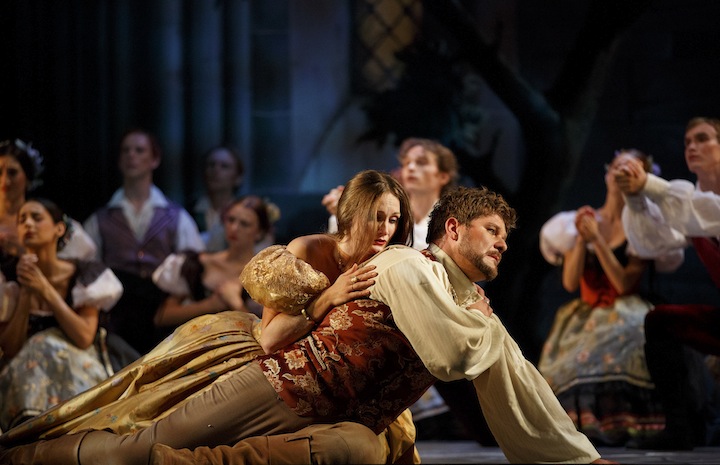
I can’t think of a better way to describe Opera Atelier’s production of Der Freischütz than with the six words found high up on the walls inside the entrance to the Elgin Theatre: Music, Vaudeville, Drama, Tragedy, Tableau and Opera.
- Classical Music 101: What Does A Conductor Do? - June 17, 2019
- Classical Music 101 | What Does Period Instrument Mean? - May 6, 2019
- CLASSICAL MUSIC 101 | What Does It Mean To Be In Tune? - April 23, 2019
Saturday night’s opening performance was also colourful, dynamic, beautifully sung and engrossing.
Just don’t expect anything resembling conventional opera stagecraft, modern or historical.
Welcome to the strange and compelling world of Opera Atelier co-artistic directors Marshall Pynkoski and Jeannette Lajeunesse Zingg. It’s a world populated by men in tights and women in opulent fabrics, where no emotion can exist without a corresponding gesture, and a place where present, past and future collide in a timeless celebration of telling stories with music and movement on stage.
Musically, things couldn’t be better, thanks to wonderful work by conductor David Fallis with the Tafelmusik Orchestra working in the Elgin’s cramped pit, an excellent cast of singers on stage, and a well-prepared chorus belting out its commentary on the sidelines.
And the music is endlessly fascinating, alternating between Singspiel-like froth and darker sounds of drama that clearly could have inspired Richard Wagner a couple of decades after its premiere in 1821.
Composer Carl Maria von Weber (1786-1826) was determined to go against the taste for Italian opera to produce a great work in German. Librettist Johann Friedrich Kind based his story on a fable of an insecure marksman who assures the hand of his beloved with the help of satanically-backed magic bullets.
The good end happily, the bad unhappily as these Romantics ponder the limits of human agency and the influence of fate. The road there is paved with lusty, folksy choruses, sweet arias and a colourful, highly evocative orchestral score.
The original story is set in the mid-17th century, perfect for Opera Atelier’s Baroque roots, but Pynkoski and costume designer Martha Mann have chosen to set it two centuries later. Despite being set in the 19th century now, everyone on stage uses only slightly softened versions of the director’s signature Baroque hand gestures and poses.
Zingg’s balletic interventions, brought up to date in small ways, like allowing the women to dance en pointe, integrate seamlessly into the story.
Gerard Gauci’s gorgeous painted backdrops are augmented by Bonnie Beecher’s clever lighting and Raha Javanfar’s high-tech video projections in the ghoulish end to the second act.
The four principal characters — tenor Kresimir Spicer as Max, the target-shy shooter, baritone Vasil Garvanliev as his feisty nemesis, Kaspar, creamy-voiced soprano Meghan Lindsay as Max’s fiancée Agathe and soprano Carla Huhtanen as the leading lady’s comic foil and bridesmaid, Aanchen — are wonderful singers as well as actors.
And where they would normally stand and deliver their arias, because this is Opera Atelier, the singers sit, recline and kneel instead.
Huhtanen’s excellent comic timing and mugging, not to mention some spectacular singing, practically stole the show whenever she was on stage.
All told, there isn’t a single dull moment in this unusual production, which should have something to say to anyone who loves musical theatre, no matter their preferences.
Performances continue to Nov. 3. You’ll find all the details here.
John Terauds
- Classical Music 101: What Does A Conductor Do? - June 17, 2019
- Classical Music 101 | What Does Period Instrument Mean? - May 6, 2019
- CLASSICAL MUSIC 101 | What Does It Mean To Be In Tune? - April 23, 2019



